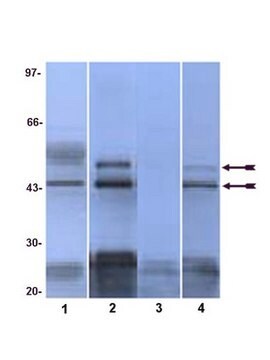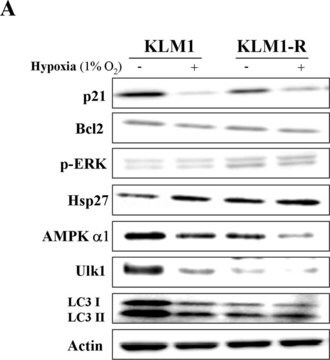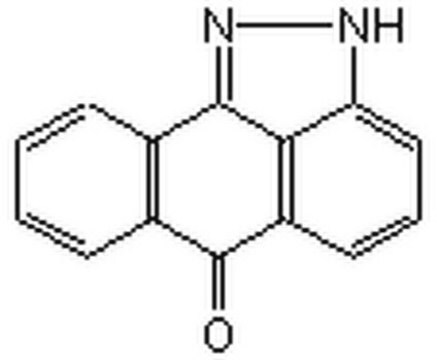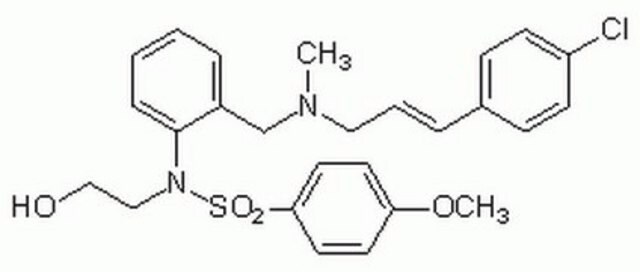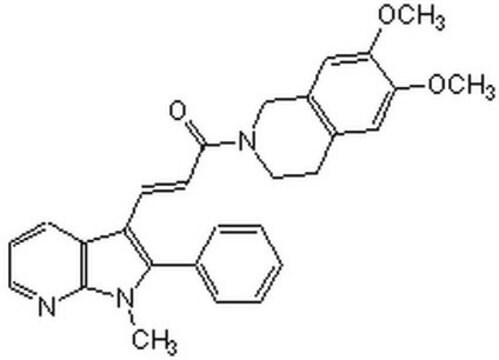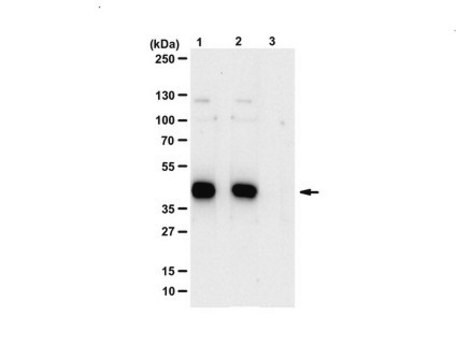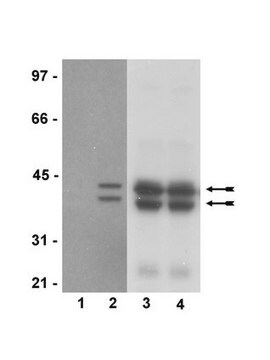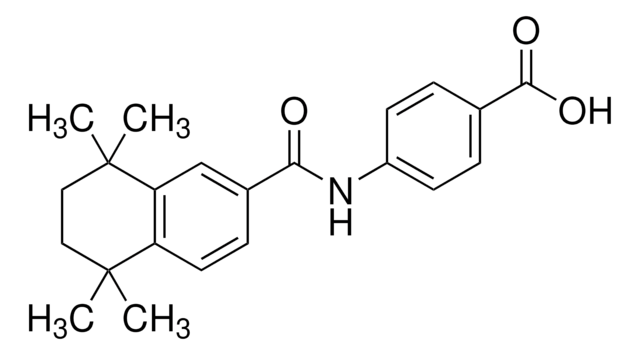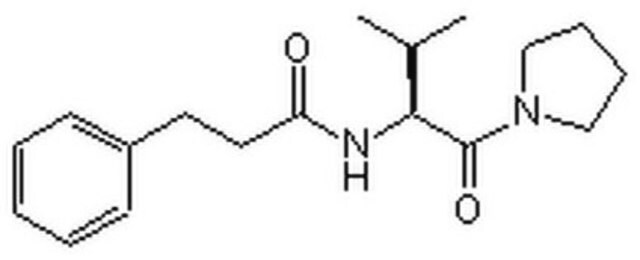추천 제품
생물학적 소스
rabbit
Quality Level
항체 형태
affinity isolated antibody
항체 생산 유형
primary antibodies
클론
polyclonal
형태
liquid
미포함
preservative
종 반응성
mouse, rat, human
제조업체/상표
Calbiochem®
저장 조건
OK to freeze
avoid repeated freeze/thaw cycles
동형
IgG
배송 상태
wet ice
저장 온도
−20°C
타겟 번역 후 변형
unmodified
유전자 정보
human ... MAPK8(5599)
일반 설명
Protein A and immunoaffinity purified rabbit polyclonal antibody. Recognizes the ~54 kDa SAPK/JNK protein.
Recognizes the ~54 kDa SAPK/JNK protein in uv-treated HEK293 cells.
This Anti-SAPK/JNK Rabbit pAb is validated for use in Immunoblotting, Immunocytochemistry for the detection of SAPK/JNK.
면역원
Human
a full-length, recombinant, human p54 SAPK/JNK2 fusion protein
애플리케이션
Immunoblotting (1:1000)
Immunocytochemistry (1:200)
Immunocytochemistry (1:200)
경고
Toxicity: Standard Handling (A)
물리적 형태
In 150 mM NaCl, 10 mM HEPES, 50% glycerol, 0.01% BSA, pH 7.5.
재구성
Following initial thaw, aliquot and freeze (-20°C).
분석 메모
Positive Control
UV treated HEK293 cells
UV treated HEK293 cells
기타 정보
Gupta, S., et al. 1996. EMBO J.15(11), 2760.
Coso, O.A., et al. 1995. Cell81, 1137.
Derijard, B., et al. 1994. Cell76, 1025.
Kyriakis, J.M., et al. 1994. Nature369, 156.
Hibi, M., et al. 1993. Genes Dev.7, 2135.
Kyriakis, J.M. and Avruch, J. 1990. J. Biol. Chem.265, 17355.
Coso, O.A., et al. 1995. Cell81, 1137.
Derijard, B., et al. 1994. Cell76, 1025.
Kyriakis, J.M., et al. 1994. Nature369, 156.
Hibi, M., et al. 1993. Genes Dev.7, 2135.
Kyriakis, J.M. and Avruch, J. 1990. J. Biol. Chem.265, 17355.
Recognizes SAPK/JNK regardless of the phosphorylation state. Variables associated with assay conditions will dictate the proper working dilution.
Recommended Protocol for Immunoblotting
Solutions and Reagents
•Transfer Buffer: 25 mM Tris base, 0.2 M glycine, 20% methanol, pH 8.5.
•SDS Sample Buffer: 62.5 mM Tris-HCl, pH 6.8, 2% SDS, 10% glycerol, 50 mM DTT, 0.1% bromphenol blue.
•10X TBS (Tris-buffered saline): To prepare 1 liter, 24.2 g Tris base, 80 g NaCl, adjust pH to 7.6 with HCl. Dilute 1:10 for use.
•Blocking Buffer: 1X TBS, 0.1% Tween®-20 detergent with 5% non-fat dry milk.
•Primary Antibody Dilution Buffer: 1X TBS, 0.1% Tween-20 detergent with 5% BSA
•Wash Buffer (TBST): 1X TBS, 0.1% Tween-20 detergent
Blotting Membrane
Nitrocellulose or PVDF membranes may be used.
Protein Blotting
A general protocol for sample preparation using 2x106 293 cells per well in a 6-well plate is as follows:
1. Aspirate media. Treat cells by adding fresh media containing regulator for desired time.
2. Aspirate media from cultures; wash cells with PBS; aspirate.
3. Lyse cells by adding 100 µl of SDS Sample Buffer and immediately scrape the cells off the plate and transfer the extract to a microfuge tube. Keep on ice.
4. Sonicate for 2 s to shear DNA and reduce sample viscosity.
5. Heat sample to 95-100°C for 5 min. Cool on ice.
6. Microcentrifuge for 5 min.
7. Load 20 µl onto SDS-PAGE gel (10 cm x 10 cm).
8. Electrotransfer to nitrocellulose membrane.
As controls, we recommend using 20 µl lysate from UV treated HEK293 cell.
Membrane Blocking, Gel and Antibody Incubations
1. After transfer, wash membrane with 25 ml TBS for 5 min at room temperature.
2. Incubate membrane in 25 ml Blocking Buffer for 1-3 h at room temperature or overnight at 4°C.
3. Wash 3 times for 5 min each with 15 ml TBST.
4. Incubate membrane and primary antibody (at the appropriate dilution) in 10 ml Primary Antibody Dilution Buffer with gentle agitation overnight at 4°C.
5. Wash 3 times for 5 min each with 15 ml TBST.
6. Incubate membrane with conjugated secondary antibody at the appropriate dilution in 10 ml Blocking Buffer with gentle agitation for 1 h at room temperature.
7. Wash membrane as in step 5.
Detection of Proteins
Chemiluminescence.
Recommended Protocol for Immunoblotting
Solutions and Reagents
•Transfer Buffer: 25 mM Tris base, 0.2 M glycine, 20% methanol, pH 8.5.
•SDS Sample Buffer: 62.5 mM Tris-HCl, pH 6.8, 2% SDS, 10% glycerol, 50 mM DTT, 0.1% bromphenol blue.
•10X TBS (Tris-buffered saline): To prepare 1 liter, 24.2 g Tris base, 80 g NaCl, adjust pH to 7.6 with HCl. Dilute 1:10 for use.
•Blocking Buffer: 1X TBS, 0.1% Tween®-20 detergent with 5% non-fat dry milk.
•Primary Antibody Dilution Buffer: 1X TBS, 0.1% Tween-20 detergent with 5% BSA
•Wash Buffer (TBST): 1X TBS, 0.1% Tween-20 detergent
Blotting Membrane
Nitrocellulose or PVDF membranes may be used.
Protein Blotting
A general protocol for sample preparation using 2x106 293 cells per well in a 6-well plate is as follows:
1. Aspirate media. Treat cells by adding fresh media containing regulator for desired time.
2. Aspirate media from cultures; wash cells with PBS; aspirate.
3. Lyse cells by adding 100 µl of SDS Sample Buffer and immediately scrape the cells off the plate and transfer the extract to a microfuge tube. Keep on ice.
4. Sonicate for 2 s to shear DNA and reduce sample viscosity.
5. Heat sample to 95-100°C for 5 min. Cool on ice.
6. Microcentrifuge for 5 min.
7. Load 20 µl onto SDS-PAGE gel (10 cm x 10 cm).
8. Electrotransfer to nitrocellulose membrane.
As controls, we recommend using 20 µl lysate from UV treated HEK293 cell.
Membrane Blocking, Gel and Antibody Incubations
1. After transfer, wash membrane with 25 ml TBS for 5 min at room temperature.
2. Incubate membrane in 25 ml Blocking Buffer for 1-3 h at room temperature or overnight at 4°C.
3. Wash 3 times for 5 min each with 15 ml TBST.
4. Incubate membrane and primary antibody (at the appropriate dilution) in 10 ml Primary Antibody Dilution Buffer with gentle agitation overnight at 4°C.
5. Wash 3 times for 5 min each with 15 ml TBST.
6. Incubate membrane with conjugated secondary antibody at the appropriate dilution in 10 ml Blocking Buffer with gentle agitation for 1 h at room temperature.
7. Wash membrane as in step 5.
Detection of Proteins
Chemiluminescence.
법적 정보
CALBIOCHEM is a registered trademark of Merck KGaA, Darmstadt, Germany
TWEEN is a registered trademark of Croda International PLC
적합한 제품을 찾을 수 없으신가요?
당사의 제품 선택기 도구.을(를) 시도해 보세요.
Storage Class Code
10 - Combustible liquids
WGK
WGK 1
시험 성적서(COA)
제품의 로트/배치 번호를 입력하여 시험 성적서(COA)을 검색하십시오. 로트 및 배치 번호는 제품 라벨에 있는 ‘로트’ 또는 ‘배치’라는 용어 뒤에서 찾을 수 있습니다.
자사의 과학자팀은 생명 과학, 재료 과학, 화학 합성, 크로마토그래피, 분석 및 기타 많은 영역을 포함한 모든 과학 분야에 경험이 있습니다..
고객지원팀으로 연락바랍니다.